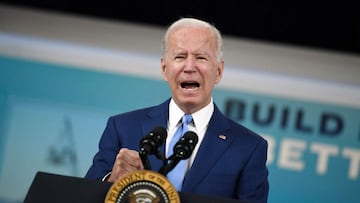US NEWS
$1400 stimulus check to social security recipients: the proposal and who supports it
The Senior Citizens League sent a letter to Congress urging them to send a targeted stimulus check to Social Security beneficiaries worth $1,400.

Each month, the average Social Security beneficiary receives a check for around $1,500. While some retirees have access to a private retirement account, like a Roth IRA, a large portion rely solely on Social Security. This means that when a crisis like the pandemic hits, inflation and other economic impacts can take a devastating toll on their disposable income. Since beneficiaries over a certain age are not allowed to work and receive benefits, their income is fixed. Without government action, they can be left in a rather vulnerable position.
Over the last year, prices of basic goods have increased rapidly. Consumers have paid higher prices across the board as the economy reopened and supply chains destroyed by the pandemic were reconstructed.
Last month the Bureau of Labor Statistics reported that over the previous year, the Consumer Price Index for “all items index increased 5.3 percent before seasonal adjustment.” For food, people are on average paying 3 percent more than they were a year ago, and for many other goods, the trends are just as worrisome.
A more targeted stimulus check
On 4 October, the Senior Citizens League, a non-profit organization, wrote a letter to Congress urging members to send a $1,400 stimulus check to those receiving Social Security benefits. The contents of the letter are extremely concerning, with the writers explaining in detail the lengths seniors have had to go to to make ends meet.
It begins by highlighting that the organization has heard from thousands of seniors “who have exhausted their retirement savings” and started “eating just one meal a day” or “ cutting their pills in half because they can’t afford their prescription drugs.”
Next year’s Cost-of-living-adjustment or COLA is expected to be announced this week.
Based on the levels of inflation seen in July and August, the SCL forecasts the COLA could reach six percent after increasing 1.3% last year. While some may argue that the financial problems experienced by seniors will be solved with the introduction of the 2022 COLA, the SCL disagrees.
The SCL has projected that the COLA may be historic in size but doubts that it will be enough to inflation. Additionally, with a significant COLA, some beneficiaries may be moved to a higher tax bracket, meaning that they could see an increase in their Medicare Part B premiums that would completely offset any gains from the COLA.
Would lawmakers agree?
The petition to raise support for the bill has reached over a million signatures, but there have been no national polls conducted to gauge the public’s opinion of the idea. So far, leaders on Capitol Hill have been silent on their support or opposition to a targeted stimulus check for seniors.
Reconciliation Bill
The $3.5 trillion reconciliation bill includes provisions that could provide sustainable assistance to seniors and those who will eventually reach retirement age.
- Medicare eligibility -- the bill would lower the Medicare eligibility age to sixty from sixty-five, allowing those who retire early to access more affordable health insurance.
- Expanded coverage -- the bill would ensure that all those receiving Medicare have vision, dental, and hearing needs to be covered in their plan. Currently, these services are not covered in basic plans but can be purchased through Medicare Advantage Plans.
- Drug prices -- the bill would give the federal government more power to negotiate drug prices, which could lead to a drop in prices, more similar to those paid in comparable nations.
Under pressure from more conservative Democrats, those leading the bill have been forced to consider taking some aspects out of the legislation. In particular, lawmakers have been pressured by pharmaceutical lobbyists to drop the third aspect of the bill. In the letter to Congress signed by the SCL, they warned against this maneuver saying that regardless of the millions spent by the industry, an exclusion of the measure would not be in the best interest of seniors.
- Social Security contributions
- Coronavirus stimulus checks
- USA coronavirus stimulus checks
- Covid-19 economic crisis
- Science
- Senior citizens
- Coronavirus Covid-19
- Economic crisis
- Pandemic
- Coronavirus
- Recession
- Economic climate
- Virology
- Outbreak
- Infectious diseases
- Social security
- Diseases
- Microbiology
- Labour market policy
- Medicine
- Work
- Economy
- Society
- Biology
- Health
- Life sciences






